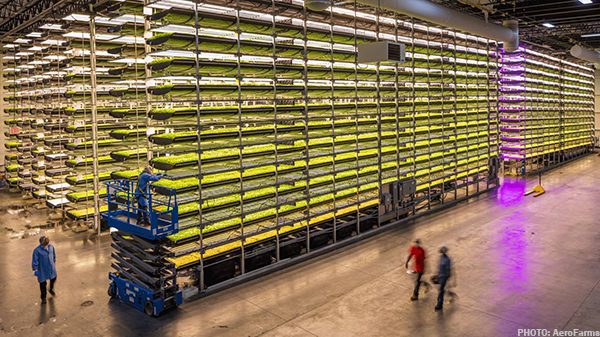Coming online in the second quarter of 2022, AeroFarms’ next-generation Model 5 farm will be the largest and most technologically advanced aeroponic indoor vertical farm in the world.
Establishing its first commercial farm in Ithaca, NY in 2004, Newark, NJ-based AeroFarms can lay claim to being one of the earliest entrants to the North American vertical farming industry, with a business that has since expanded to include a farm in a former pinball and laser tag arena.
Cofounder Marc Oshima says the motivation behind AeroFarms was achieving local production in a cost effective way, while delivering cleaner, safer products.
“The focus was how to offer a high-quality product that doesn’t have the transportation miles or shrinkage issues you normally have,” he recalls. “Locally grown is the number-one trend in the United States, bigger than organic. People feel a connection to their food.”
Oshima says the concept was to create the perfect environment for plants through the use of aeroponics, which has taken AeroFarms to the status of the world’s largest aeroponic grower.
“We grow with up to 90 percent less water than in the field, and even 40 percent less than a hydroponic grower,” he says.
However, more than just local, Oshima says AeroFarms was motivated by modern agriculture’s vulnerability to future weather events and scarcity of water.
It is here that Oshima believes vertical farming can make a difference. Able to control all aspects of the growing environment, he says AeroFarms can deliver nutrient-dense, high-quality products to stores within 24 hours, year-round.
“This is a bigger proposition than just being local,” Oshima argues. “We think we can grow anything. We’ve already grown over 550 varieties and have done work in seed genetics with traditional farming.”
One of the company’s more recent developments is in micro-broccoli, a product highlighted by Whole Foods Markets as one of the “top health trends” for 2022. Aa a certified B Corporation, AeroFarms is working on a pipeline of projects, and not just in the United States.
A new farm is being built in Abu Dhabi, U.A.E., while sites in Virginia, North Carolina, and the St. Louis area are set to debut.
Partnering with HortiFrut SA (NaturRipe Farms, LLC BB #:165382) for berries, Cargill, Inc. for cacao, and Anheuser-Busch InBev SA/NV in the production of finishing hops for beer, AeroFarms is working across a range of categories.
Of course, despite all the optimism, Oshima says vertical farms are not without their challenges. “You have to be well aligned with long-term investors, and in many cases, you’re taking your workforce from urban areas with no connection to farming,” he explains.
However, Oshima says by offering a consistent, reliable source of production, the opportunities for the industry are huge.
This is an excerpt from the Applied Technology feature in the March/April 2022 issue of Produce Blueprints Magazine. Click here to read the whole issue.
Establishing its first commercial farm in Ithaca, NY in 2004, Newark, NJ-based AeroFarms can lay claim to being one of the earliest entrants to the North American vertical farming industry, with a business that has since expanded to include a farm in a former pinball and laser tag arena.
Cofounder Marc Oshima says the motivation behind AeroFarms was achieving local production in a cost effective way, while delivering cleaner, safer products.
“The focus was how to offer a high-quality product that doesn’t have the transportation miles or shrinkage issues you normally have,” he recalls. “Locally grown is the number-one trend in the United States, bigger than organic. People feel a connection to their food.”
Oshima says the concept was to create the perfect environment for plants through the use of aeroponics, which has taken AeroFarms to the status of the world’s largest aeroponic grower.
“We grow with up to 90 percent less water than in the field, and even 40 percent less than a hydroponic grower,” he says.
However, more than just local, Oshima says AeroFarms was motivated by modern agriculture’s vulnerability to future weather events and scarcity of water.
It is here that Oshima believes vertical farming can make a difference. Able to control all aspects of the growing environment, he says AeroFarms can deliver nutrient-dense, high-quality products to stores within 24 hours, year-round.
“This is a bigger proposition than just being local,” Oshima argues. “We think we can grow anything. We’ve already grown over 550 varieties and have done work in seed genetics with traditional farming.”
One of the company’s more recent developments is in micro-broccoli, a product highlighted by Whole Foods Markets as one of the “top health trends” for 2022. Aa a certified B Corporation, AeroFarms is working on a pipeline of projects, and not just in the United States.
A new farm is being built in Abu Dhabi, U.A.E., while sites in Virginia, North Carolina, and the St. Louis area are set to debut.
Partnering with HortiFrut SA (NaturRipe Farms, LLC BB #:165382) for berries, Cargill, Inc. for cacao, and Anheuser-Busch InBev SA/NV in the production of finishing hops for beer, AeroFarms is working across a range of categories.
Of course, despite all the optimism, Oshima says vertical farms are not without their challenges. “You have to be well aligned with long-term investors, and in many cases, you’re taking your workforce from urban areas with no connection to farming,” he explains.
However, Oshima says by offering a consistent, reliable source of production, the opportunities for the industry are huge.
This is an excerpt from the Applied Technology feature in the March/April 2022 issue of Produce Blueprints Magazine. Click here to read the whole issue.



